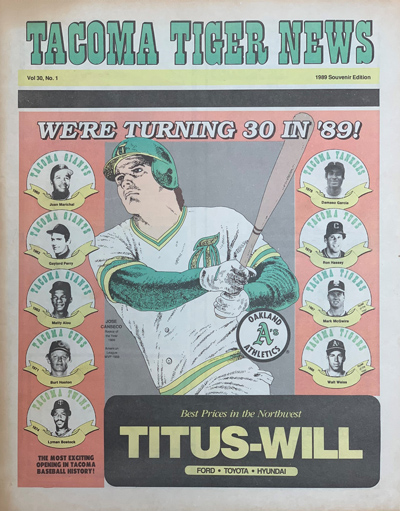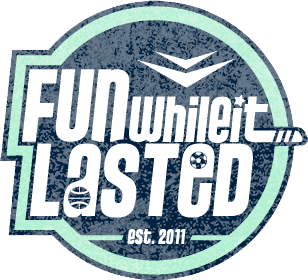Pacific Coast League (1980-1994)
Tombstone
Born: November 1979 – Re-branded from Tacoma Tugs1Payne, Bob. “Now it’s the Tacoma Tigers”. The News Tribune (Tacoma, WA). November 16, 1979
Re-Branded: November 1, 1994 (Tacoma Rainiers)2Lawrence, John. “New name, 90’s marketing”. The News Tribune (Tacoma, WA). November 2, 1994
First Game: April 12, 1980 (W 5-1 @ Hawaii Islanders)
Last Game: September 5, 1994 (L 8-6 vs. Albuquerque Dukes)
Pacific Coast League Championships: None
Stadium
Cheney Stadium (10,000)31994 Tacoma Tigers Program
Opened: 1960
Dimensions (1994): Left:325′, Center: 425′, Right: 325′41994 Tacoma Tigers Program
Marketing
Team Colors:
- 1994: Green, Gold & White51994 Tacoma Tigers Program
Ownership & Affiliation
Owners:
- 1980-1990: Baseball Tacoma, Inc. (Stan Naccarato, et al.)
- 1991-1994: George Foster
Sale (1991): ~$5.5 million (Tacoma Baseball, Inc. to George Foster)6STAFF & WIRE REPORTS. “Chicken processor buys Tacoma Tigers”. The Chronicle (Spokane, WA). January 9, 1991
Major League Affiliations:
- 1980: Cleveland Indians
- 1981-1994: Oakland Athletics
Attendance
Tilting your mobile device may offer better viewing.
Source: The Encyclopedia of Minor League Baseball (3rd ed.), Lloyd Johnson & Miles Wolff, 2007
Background
The Tigers were Tacoma, Washington’s Pacific Coast League entry for fifteen summers between 1980 and 1994. Contrary to what a modern day reader might deduce from the name, the Tacoma Tigers never served as a farm team of Major League Baseball’s Detroit Tigers. Rather, after cycling through four different identity changes during the 1970’s (Cubs, Twins, Yankees & Tugs), the team’s local owners decided in 1980 to turn back the clock and honor the Tacoma minor league clubs that traditionally played under the Tigers name in various leagues between 1901 and 1951.
For the 1980 season, the Tacoma Tigers remained top farm team of the Cleveland Indians, as the Tacoma Tugs has been in 1979. In 1981 the Oakland Athletics replaced the Indians as Tacoma’s parent club, inaugurating a 14-season partnership that would endure for the rest of the Tigers era through 1994.
Pipeline to Oakland
The Oakland A’s dynasty of the late 1980’s, which saw the big club play in three consecutive World Series from 1988 through 1990 and win it all in 1989, was boosted by a steady pipeline of prospects that came up through Tacoma’s Cheney Stadium. This group included pitchers Eric Plunk (Tacoma ’85-’87) and Curt Young (Tacoma ’83-’86) and infielders Mike Gallego, Tony Phillips and Walt Weiss (Tacoma ’87). Gallego and Phillips both spent parts of five seasons with Tacoma.
Jose Canseco and Mark McGwire, the two sluggers most closely identified in the popular memory with those dominant A’s teams, both spent superb seasons in Tacoma. Canseco slashed .348/.440/.567 in 60 games as a 20-year old in 1985. McGwire arrived the following season and hit .314/.406/.568 in 78 games.
Later era top prospects included corner infielders Scott Brosius (Tacoma ’90-’93) Jason Giambi (Tacoma ’94). Brosius would go on to win three World Series titles with the New York Yankees and was named World Series MVP in 1998. Giambi would win the American League’s Most Valuable Player award with Oakland during the 2000 season.
Also of note: the outfielder Billy Beane split his final pro season in 1989 between Oakland and Tacoma. Beane would go on to become a famed Oakland A’s front office executive and the subject of Michael Lewis’ classic book Moneyball and the film of the same name, in which he was portrayed by Brad Pitt.
Tacoma Tigers Shop
In Memoriam
Long-time Tacoma Tigers (and Tugs and Yankees and Twins) General Manager Stan Naccarato passed away on May 25th, 2016 at the age of 88.
Links
##


